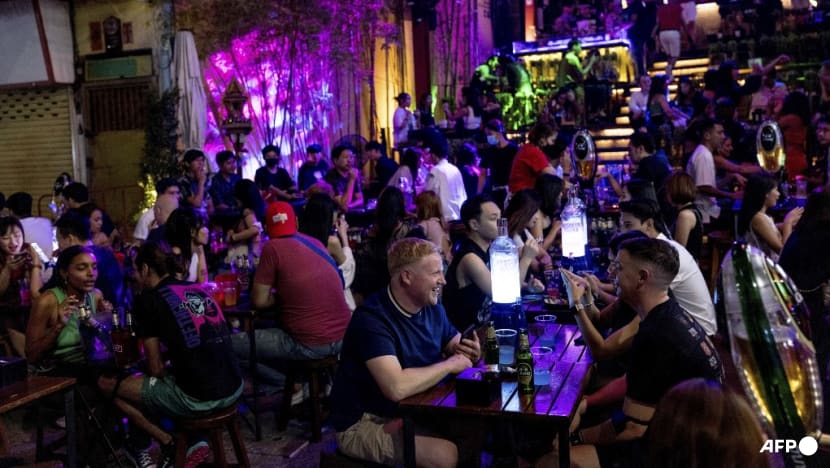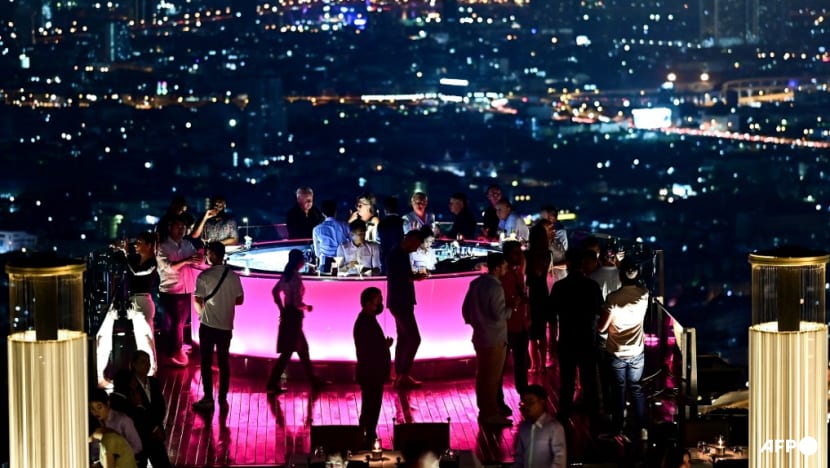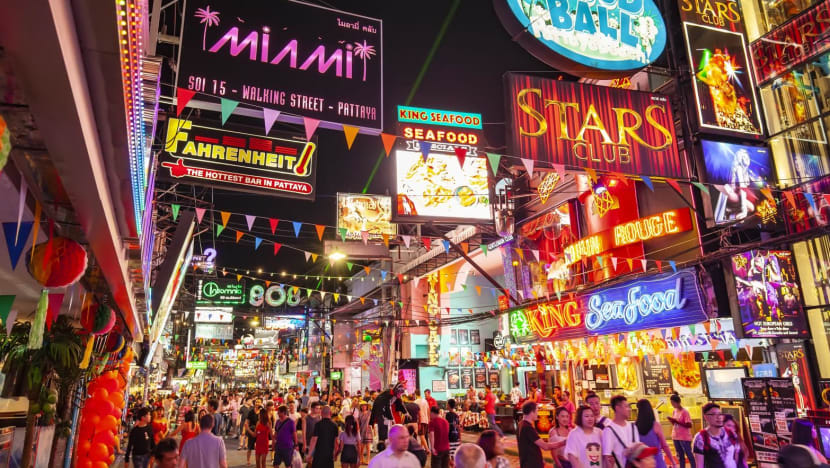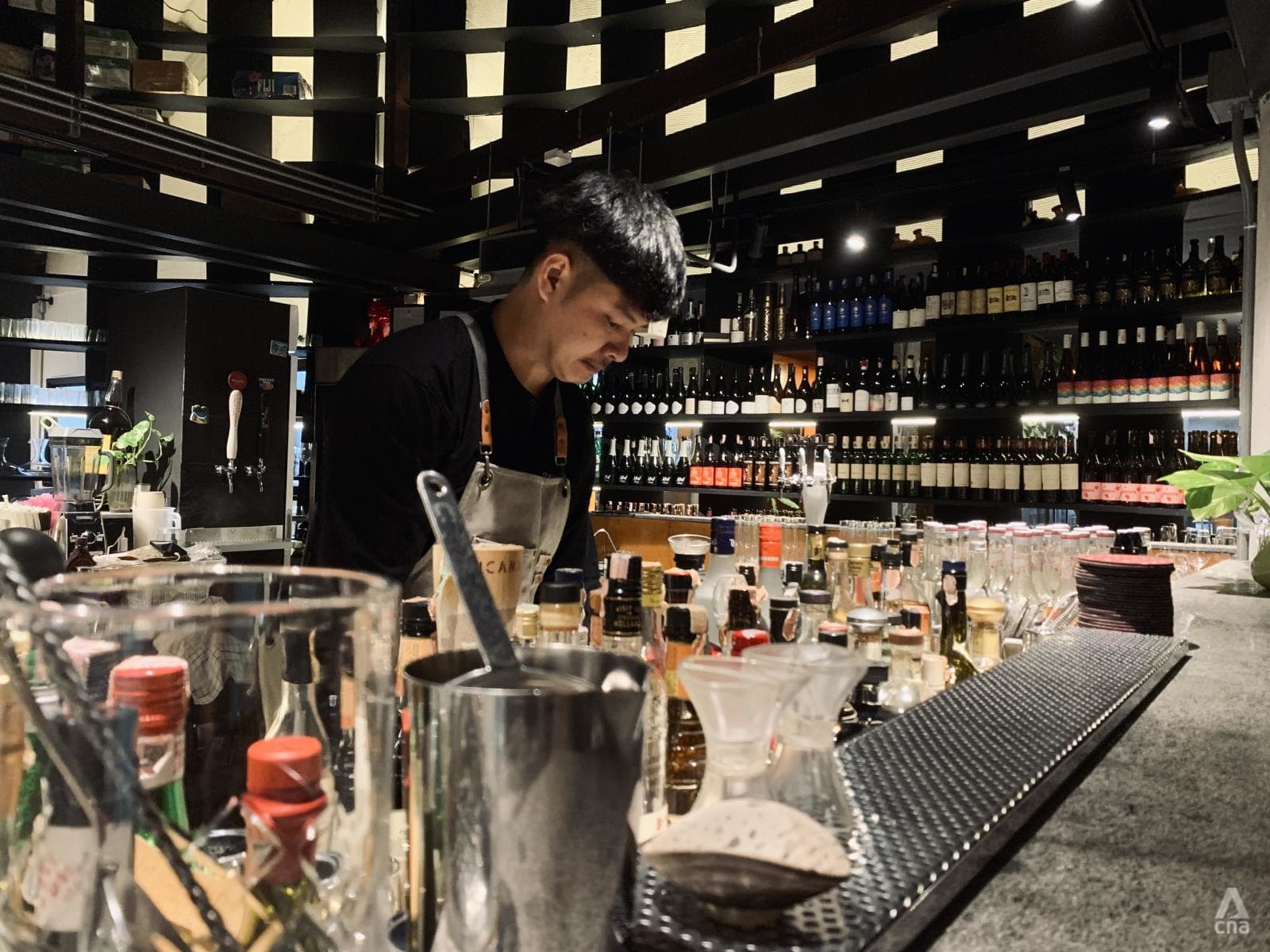Thailand's nightclubs now open later till 4am, but cocktail of factors dilutes hopes of tourism revival
Lack of Chinese tourists in the kingdom is still holding back the tourism sector. While safeguards are in place to prevent drink-driving, critics say they are unlikely to be implemented.

Entertainment venues on Bangkok's popular tourist and nightlife strip Khaosan Road are among the city's night-time businesses recently allowed to extend their opening hours to 4am as the Thai government hopes to boost the tourism sector. (File photo: AFP/Jack Taylor)

This audio is generated by an AI tool.
BANGKOK: Nightlife venues in Thailand have seen increased customer spending following a recent extension of operating hours from 2am at the latest to 4am, which the government hopes will boost the post-pandemic tourism sector and inject more money into the economy.
Still, observers say the growth is unlikely to be significant as the night-time industry contributes little to the country’s gross domestic product (GDP) and the main tourist group from China are spending less.
The longer operating hours have also raised concern about the increased risk of accidents related to drink-driving in the Southeast Asian nation, where the World Health Organization (WHO) says road accidents killed 17,000 people and left 15,000 others with disabilities last year alone.
“The pilot programme will be helpful, but it is unlikely to significantly boost the tourism sector as the night industry contributes only about 1 per cent to Thailand’s GDP, which translates to about 5 per cent of tourism receipts,” said Mr Eugene Tan, an economist at Moody's Analytics.
“Despite the potential benefits for businesses, we do not expect the extension to substantially boost tourism income overall,” he added.
The extended operating hours are part of the new rule by the Ministry of Interior, which came into effect last Friday (Dec 15).
They apply to licensed night-time businesses such as pubs, bars, discotheques, karaoke venues and massage parlours in select tourist areas namely Bangkok, Chon Buri, Chiang Mai, Phuket and the Samui island in Surat Thani as well as those in legally-registered hotels nationwide.
The new rule has also allowed pubs and bars across the country to stay open until 6am on New Year’s Day, as the government made a final push to boost tourism this year.

Thailand hopes to attract 28 million foreign tourists – including 4.4 million from China – and generate 1.4 trillion baht (US$40 billion) in revenue by the end of 2023.
As of Dec 17, data from Thailand's Ministry of Tourism and Sports showed 26.5 million tourists have visited the country since Jan 1 and only 3.3 million of them are Chinese. The total spending of all the international tourists was reported at 1.1 trillion baht.
While the target for tourist arrivals may be achieved, Mr Tan noted it is “highly improbable” for Chinese tourist arrivals to exceed 4.4 million and that the revenue generated from tourism is likely to fall short.
“One contributing factor is the uncertain domestic conditions in China, which are prompting Chinese tourists to exercise caution in budgeting,” the economist explained, adding that limited flight capacity from China to Thailand and increased flight costs have also left Chinese tourists with less money to spend.
Before the COVID-19 pandemic, China was Thailand's biggest source of international visitors. Out of 40 million foreign visitors in 2019, more than 11 million were Chinese.
MORE CUSTOMERS, MORE MONEY
In Bangkok, 146 nightlife venues are reportedly able to extend their operating hours to 4am, including The Club on the popular Khaosan road.
Its assistant manager Ms Kanyanat Rookkhason told CNA the number of customers has increased by 30 per cent on Friday and Saturday since the new rule came into effect.
The nightclub is one of the very few venues in the area that are licensed to operate until 4am. Similar to many businesses on Khaosan road, it is recovering from the COVID years.
“With the extended hours, customers are likely to spend more money and that helps,” Ms Kanyanat said, adding foreigners make up about 60 per cent of The Club’s clientele.
“Customers who might be scattered elsewhere now come here to listen to live music. We’ve welcomed more customers and they now stay longer. This should be good in the long term.”
However, it is early days and the nightclub has yet to hire more employees. According to its assistant manager, some customers may stay longer but it does not mean their spending would increase by much.
“They don’t spend so much more,” she said. “Still, it’s higher than before.”

For Mr Karn Liangsrisuk, who owns a restaurant and a cocktail bar on Sukhumvit road, the new rule may help inject more money into the economy but it only benefits a select few that operate late.
Instead of extending the operating hours until 4am, he suggested the government should lift the ban on the sale of alcoholic beverages between 2pm and 5pm, as this could stimulate tourist spending in more places.
Currently, alcohol can be sold from 11am to 2pm and from 5pm until midnight in Thailand, unless the sale takes place at international airports or entertainment venues.
“Tourists come here for a vacation and they already start drinking early,” Mr Karn said.
“They’re more likely to be confused why they can’t buy alcohol between 2pm and 5pm. So, fix this rule first.”
The entrepreneur recently opened a cocktail bar but chose to keep it open until 1am. He told CNA he does not want his employees to work long hours and that his clientele are not partygoers.
“If it stays open until 4am, there will be more expenses from employees and utility bills. The bar will deteriorate fast and has to be renovated,” he explained.
GET BREATHALYSED BEFORE DRIVING
Although the new rule was introduced with safety measures to prevent negative social impact such as drink-driving and related casualties, critics say these safeguards are unlikely to be implemented.
Earlier this month, the National Alcohol Beverage Policy Committee advised operators of night entertainment venues to strictly follow the law, which prohibits them from selling alcoholic beverages to individuals under 20 years of age or drunk persons.
They were also asked to breathalyse every customer who drives before they leave the premises.

In case the percentage of alcohol is higher than 50mg per 100ml of blood, business operators are required to either provide the customer with a rest area, where they can wait until it is safe to drive back, or contact their friend, relative or a paid driver to take them back.
“This is pushing the burdens to business operators, and they won’t do it,” said Dr Tairjing Siriphanich, secretary-general of the Don't Drive Drunk Foundation.
“Various measures existing in Thailand haven’t been able to control drunk drivers…They aren’t practical.”
While stimulating the economy is good for the country, Dr Tairjing cautioned it must come with safety, noting the number of road traffic injuries in Thailand is already high and that the longer operating hours of night-time entertainment venues could increase the risk of road accidents in the future.
Between Jan 1 and Dec 22 this year, road accidents resulted in 13,656 deaths and 782,316 injuries in the country, according to the Thailand Road Accidents Data Centre for Road Safety Culture (ThaiRSC).
Last year, it reported 14,965 deaths and 927,016 injuries due to road accidents, an increase from 13,657 deaths and 883,306 injuries in 2021.
One day after the new rule was introduced by the Interior Ministry, a foreign tourist was arrested for drink-driving, driving without a licence and causing deaths and injuries by reckless driving.
The car he allegedly drove hit workers on the road in Chiang Mai, killing one and severely hurting two others, local media reported.
The tourist reportedly had gone to a pub with friends before the accident occurred.
“There must be a working committee to assess the social impact of the policy,” Dr Tairjing said.
“Of course, the revenue will increase but in exchange for lives, and I don’t think that’s right.”















